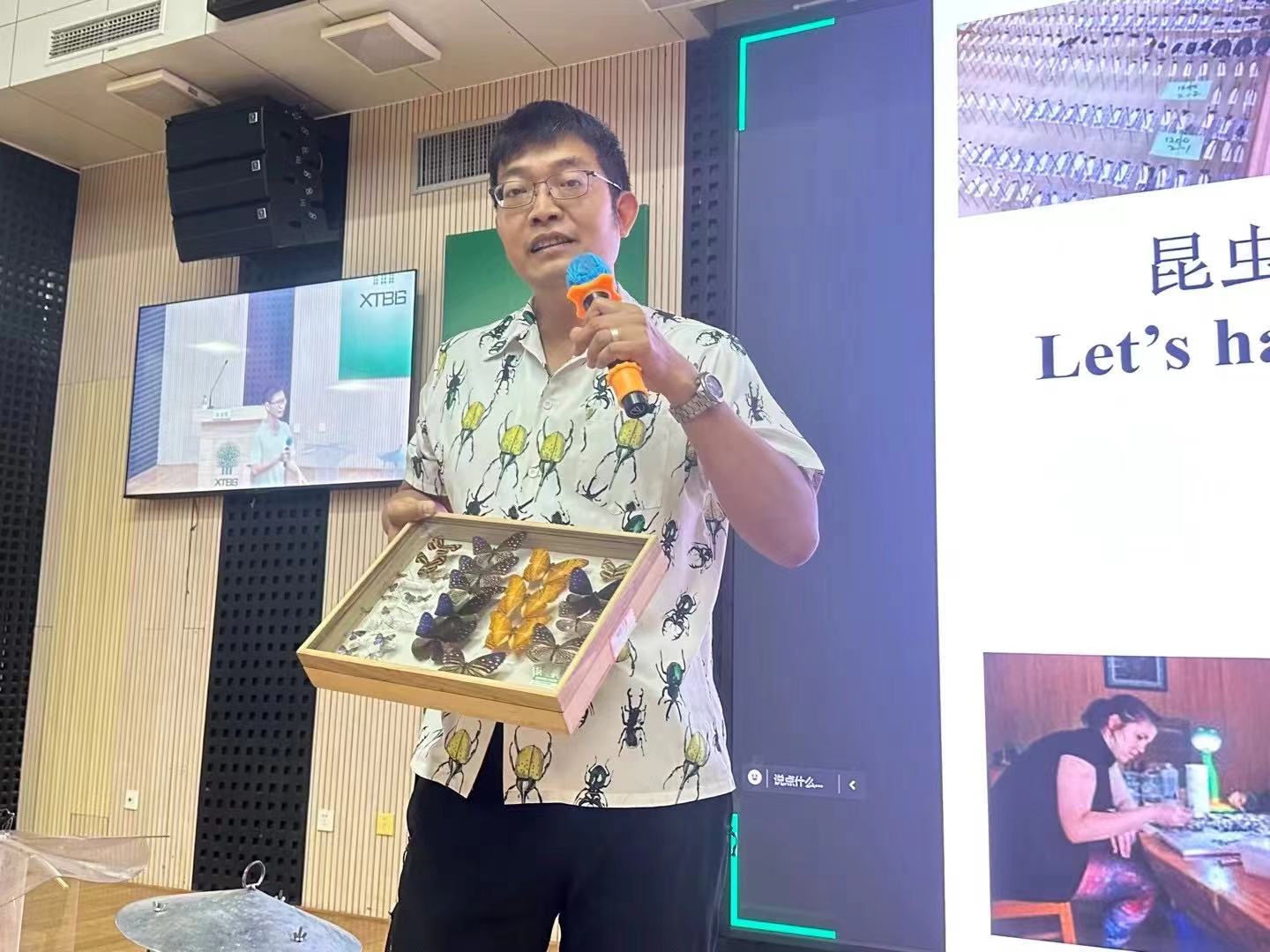Great Deeds of Bio-conservations in Insect World

Akihiro Nakamura shows insect specimen during a lecture. (COURTESY PHOTO)
By?BI?Weizi?and?CHEN?Chunyou
Akihiro Nakamura loves to climb trees, because he says magical creatures of the insect world only live on the highest branches. A researcher at Xishuangbanna Tropical Botanical Garden (XTBG), Chinese Academy of Sciences (CAS), Nakamura focuses on insect ecology, community ecology and conservation ecology.
"We use a variety of ecological research methods to study biodiversity and its ecosystem processes in natural and human-disturbed habitats, and conduct insect surveys across altitude gradients in fragmented tropical rainforests and rubber plantations to understand the impact of human disturbance on biodiversity under different climatic conditions," he told Science and Technology Daily.
Xishuangbanna: an ecologist's dreamland
In 2008, Nakamura graduated from Griffith University (Australia) with a Ph.D. in ecology and began field research in Yunnan province, southwestern China, as part of a collaborative research program between CAS and the government of Queensland, Australia. His research sparked curiosity about this haven of biodiversity and inspired him to accept an offer to carry out research at XTBG in 2013, located in Xishuangbanna Dai Autonomous Prefecture in the far south of Yunnan province, bordering both Myanmar and Laos.
If Xishuangbanna is an oasis on the Tropic of Cancer, then XTBG is the most dazzling gem in that oasis. This 1,125-hectare park preserves over 13,000 species of tropical plants in its 35 living collections, including over 301 families and 2,110 genera. In the eyes of ecologists, this vast beauty holds a plethora of secrets about nature. Hundreds of researchers and students from more than 30 countries work together there to decipher nature's code. Nakamura is one of them.
Another competitive advantage of XTBG that attracted Nakamura is the adequate financial support provided by the Chinese government for advanced research with state-of-the-art facilities and the involvement of institutes such as CAS. The facilities include the canopy cranes, which are used in forested areas to access the canopy layer of trees. There are less than 20 of the cranes in the world, and half of them are in China.
"Even though I'm not working on rocket science or some other cutting-edge high-end industry, I still get support from the government. You can see that China really cares about basic science and its commitment to protecting biodiversity," said Nakamura.
The importance of studying insects
"It's a natural reaction of people to be afraid of something they don't know, so one of my goals is to educate people about the important roles of insects that they play in the whole ecosystem," said Nakamura, noting that more than 90 percent of the insects that may exist in the world have not yet been named. He often invites elementary school students to the lab and shows them the beauty of these insects. This often sparks their curiosity and takes away the fear of bugs.
He gave the example of ants. One might be afraid of ants or find them quite annoying, but if you think about it, ants always pick up the pieces of cookies that people accidentally drop on the floor, so they pick up waste. "That is the important ecological service role that these insects play, cleaning up the organic waste in nature," he said, adding that a study conducted in Malaysia found that more than 50 percent of the waste in the forest was cleaned up by ants.
Biodiversity doesn't stop at borders
Speaking about research work in China, Nakamura believes that international cooperation in biodiversity research is a unique advantage of XTBG. Foreign researchers and international students from more than 30 countries and regions have joined forces to provide intellectual support for the cause of biodiversity conservation.
"My team is truly international, with researchers from 10 countries, including Laos, Thailand, the Philippines, Nepal, Sri Lanka and other countries," he said, adding that international cooperation can enable researchers from different countries to share research results and provide an international perspective for ecological protection of the whole region.
A number of memoranda of understanding were signed between XTBG and other research institutes from Japan, Thailand, the Czech Republic and other regions and countries. China has also established joint border protection areas with neighboring countries in Xishuangbanna. At present, the China-Laos border area has established a green ecological corridor on the China-Laos border, covering an area of about 200,000 hectares.
"I don't think I can do my work anywhere else outside of China, as XTBG is the right choice for me," said Nakamura. In 2019, he received the Caiyun Award, established by the Yunnan provincial government to recognize foreign professionals who have made outstanding contributions to local economic and social development.






